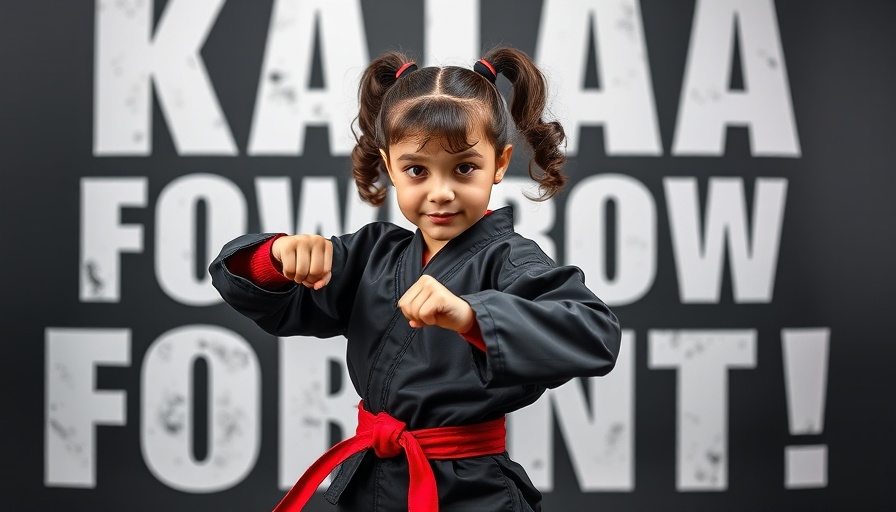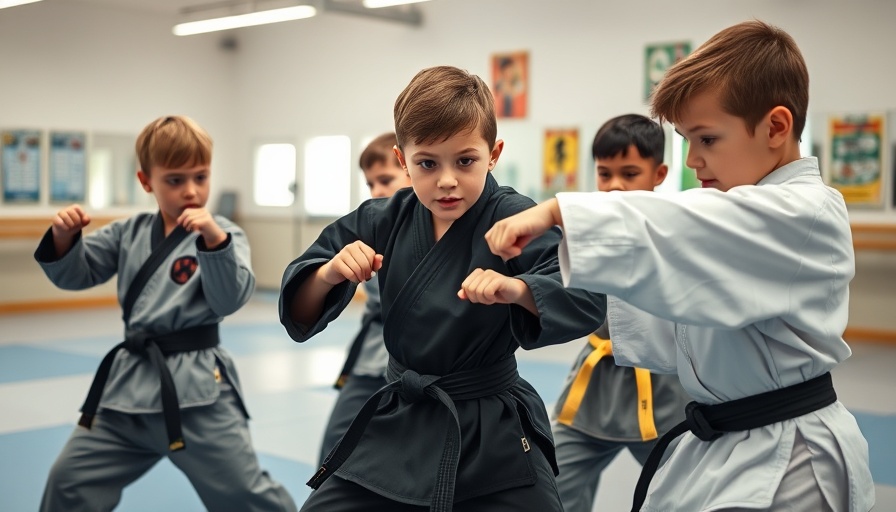
Understanding Teenage Stress: A Growing Concern
Today's adolescents face unprecedented levels of stress stemming from academics, social pressures, and tumultuous hormonal changes. As noted in a supporting article, many teenagers report feelings of anxiety before significant events, whether it's a test, a sports competition, or a social gathering. Without adequate coping mechanisms, this stress can spiral into more serious issues like anxiety and depression. It’s essential for parents to acknowledge the unique pressures their teens face as they navigate these formative years.
How Martial Arts Can Help in Stress Management
Martial arts isn't merely about physical fitness; it’s a powerful tool for mental wellness. In a supportive training environment, teens learn to manage their emotions and stress levels. The structured routines inherent in martial arts instill a disciplined approach to working through challenges. Participants gain resilience, transforming stress into motivation to push them forward in their personal and academic lives. For parents seeking solutions for their children’s stress management, martial arts offers a proven opportunity to build inner strength while fostering a sense of community.
Building Confidence Through Technique Mastery
As teens progress in their martial arts training, they receive direct feedback and measurable goals through belt promotions and skill advancement. This incremental system fosters a deep sense of achievement that can boost self-confidence significantly. With improved self-esteem, teens become better equipped to handle social interactions and academic pressures. According to a referenced study, mastering complex techniques can afford young practitioners a profound sense of accomplishment, triggering feelings of control and confidence that contribute positively to their everyday lives.
The Role of Discipline and Focus in Martial Arts
Martial arts training demands focus and discipline, allowing teens to learn essential life skills. This structure trains them to manage their time effectively between martial arts, school, and personal life. The lessons learned in the dojo often translate to improved performance in academics as their increased focus enhances their attention span and ability to concentrate during studies. Parents may notice their teens displaying more self-discipline not only in martial arts but in various aspects of their daily routines.
Physical Benefits: A Pathway to Health
As sedentary lifestyles become more common due to technology, martial arts provides an engaging route to fitness. The intense physical exertion involved in martial arts helps teens combat inactivity and promotes better health. Continued activity correlates with better emotional regulation, further alleviating the stresses faced by many adolescents. Moreover, participating in martial arts is a constructive alternative to time spent in front of screens, providing a holistic balance of physical activity and mental training.
Incorporating Mindfulness: A Full Circle Approach
Many martial arts disciplines integrate mindfulness and meditation into their training sessions, presenting yet another benefit. This aspect assists teens in developing emotional clarity and relaxation techniques that serve them in their daily lives. A clearer mind translates into better stress management, allowing students to face their challenges—whether academic or personal—with calmness and poise. Parents encouraging mindfulness practices in conjunction with martial arts can observe a noticeable improvement in their children's emotional stability.
Connecting with Peers: Your Community in the Dojo
Social isolation can exacerbate feelings of anxiety and depression among teens. Martial arts classes create an essential support network where shared goals and collective workouts help foster friendships. The opportunity to interact with peers in a structured setting encourages the development of essential social skills. Community support can play a pivotal role in bolstering self-assurance, helping teens better navigate the stresses of adolescence.
Practical Steps for Parents: Getting Started with Martial Arts
To introduce your teen to martial arts, explore local schools and attend classes together. Observing a class can provide insight into teaching styles and the overall environment, helping determine if it's a good fit for your child. Talk openly with instructors about your child's needs and stresses; they are often equipped to offer tailored support. The first step can be scheduling a trial class, so your teen can experience firsthand the benefits of martial arts.
Conclusion: Empower Your Teen Today
In summary, martial arts can serve as a constructive outlet for stress, an aid in building confidence and resilience, and a community for social interaction. By investing in martial arts training, parents can offer their teens the tools they need to navigate life's complexities successfully. Consider enrolling your child in a local martial arts class—empower them not just in self-defense, but in every area of their lives.
 Add Row
Add Row  Add
Add 








Write A Comment